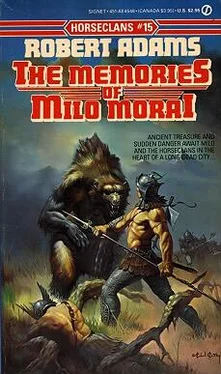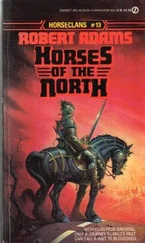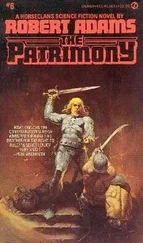Her voice still had its little-girl quality, but her words had been those of an adult woman, spoken in the pure, accentless French of her mother. “You, monsieur, are a pure and unadulterated man, and if Mama still did not live, I would make you mine, immediately. Please promise me that when the time comes for me to marry, you will find for me a brave, gentle and tender officer just like you. I so wish that you really were my father by blood, monsieur, for a son like you would be my dearest pride and treasure.”
Gaby’s first husband, a young USMA graduate, had died in Milo’s arms, early on in the country’s involvement in the Vietnam quagmire. That was when she and her brother had gotten involved in the leftist-controlled antiwar movement. Gaby, thankfully, had possessed intelligence, maturity and strength of will to get out of the thing before it irrevocably warped her mind as it did so many others. Her brother, on the other hand—and despite Milo’s attempt to drag him out of it, away from bad companions—had sunk into violently radical Marxism and perversion and had finally taken to the drugs that ended his life so prematurely.
When the Army had brought Milo back from South-east Asia in the early 1970s and hurriedly retired him because, according to the Department of Defense records, he was far too old a man to remain on the active list, he had gotten involved with various foreign governments that proved more than willing to hire the services of an officer with such impressive credentials, regardless of his official age. Spending, as he had been, more and more time out of the United States and never knowing just what fate the future might hold for a man in such perilous places and situations, he had deposited a largish chunk of fluid assets in a Swiss bank account for personal use and possible emergencies, then instructed the law firm which had handled his and the estate affairs since the mid- 1940s to draw up a new document dividing the Stiles fortune and properties among his three living adoptive children—Gaby, Melusine, twin of by then dead Michel, and Per, by then in hospital getting used to a replacement for the leg a landmine had taken.
Once he had signed the documents, made the transfers official, he had taken advantage of certain aspects of his new employment to drop out of sight of all who had known him in his earlier life, even “his” children. He found it quite a relief to thus change identities, for all that the people among whom he now moved never, ever asked questions the answers to which might be embarrassing, lest someone so question the interrogator; not that Milo could have given an intelligent answer to many of the inconsistencies, anyway. He, least of all, understood just why, at an estimated minimum seventy years of age, he looked no whit different from the Milo Moray who had enlisted in the United States Army years before the Second World War.
In the company of his family and those who had known him for long periods of time, his unchanged, unchanging physical appearance had been an embarrassment, to say the least. Here, in this new life, his peers simply assumed that he had had skilled plastic surgery at the same time he had changed his name and obtained new, forged passports and documents, for not a few of them had done one or more of these very things at some time or some place in their checkered pasts.
For some years, until the venerable attorney died of old age and a bad heart, Milo had been able to keep track of the three kids and their ups and downs of life through John Bannister. Per had taught at West Point, briefly, gone out to Montana to personally check on some family holdings there and ended up marrying and settling down in that state; he had taught him-self to ride horses again, sired several children and eventually, trading shrewdly on his war record and fortune, entered quite successfully into first state, then national politics.
Poor little Melusine had had a rougher time of it. Her judgment with regard to people had proved almost as faulty as had been that of her deceased twin and had resulted in a succession of unhappy, mercifully short marriages to handsome but shallow men who had all developed to be far more interested in her wealth, the status and material objects it could buy, than in her. Finally, disillusioned and teetering on the verge of insanity, sodden with alcohol and addicted to various drugs, the miserable woman had left a hospital to live in the adjacent convent of the nursing order. After some years, she took holy orders and signed her third of the patrimony over to the church. Bannister had assured Milo that her letters and the single, brief meeting he had had with her had convinced him that Melusine Moray had at last found happiness and true contentment. At the turn of events, Milo had not been able but to wonder just what her true father’s opinion would have been; though deeply religious in his own way, General Jethro Stiles’ opinions of organized religions in general had been unprintable in any known language.
Gaby had remarried at about the time Milo had been forcibly repatriated and pensioned off. He had taken part in the wedding ceremony, had again given her away to a young paraplegic a couple of years her senior, a man who had been a classmate of her late husband’s and who had, like him, been one of Milo’s junior officers in Vietnam. Thanks to modern medical advances, Gaby had had two children by her second husband before he died by his own hand in one of his periodic fits of despondency, whereupon she had settled down to making a full-time job of raising her children.
But after old Bannister had died, Milo had grad-ually lost any really personal contact with the survivors of his onetime family, which explained why he had not even known of his Gaby’s marriage to the vital, charismatic former-general, Noonan, who had among other things been frequently mentioned as a prime contender for the then-in-power party’s next presidential campaign, which now, of course, would never take place.
In the huge, sprawling home that had been Noonan’s, even Crippen and his men were not unduly crowded, and although all of the frozen and refrigerated foods were long since spoiled and had to be buried, there still were enough supplies of canned and otherwise preserved foods to keep them adequately, with venison and other game brought in by Milo, Master Sergeant Lyon and two or three other experienced hunters.
After three days of hourly broadcasts, they finally got a response from the state capital at Sacramento. Crippen had had to go to great lengths and into meticulous and personal detail before he was able to achieve belief as to his identity. Since no one had seen him and his force or radioed of his whereabouts since his column had left Barstow, he and all of them had been assumed dead either of the plagues or of hostile action.
Once they were certain that it really was Colonel Crippen, however, the governor himself began to transmit, sounding very tired and more than a little distraught. “David? It’s truly you, then? How many men are with you?That few, huh? Well, even that many is better than none at all, I suppose. How far from here are you?At Noonan’s place? How the hell did you . . . never mind. Have you got transport? Good, get up here just as fast as you can with all the arms you can scrape up and plenty of ammo. We’re in terrible need of more disciplined troops; half the city is dead or dying and the other half is starving and on the verge of riot and rebellion. . . . No, I won’t order you, David. I know that you and those with you must have gone through pure hell already. But I plead with you, rather. You’re needed desperately, colonel . . . no, I guessit’s general, now, since you’re the highest-ranking State Military Reserve officer left alive.”
Two days later, while helping to make certain that all of the vehicles were in tip-top condition, Milo accidentally found General Noonan’s hidden armory of what had, until recently, been completely illegal weapons and equipment. Strong and strictly enforced federal and state and local laws had forbidden the ownership by private citizens of such things as hand-held surface-to-air missiles, anti-armor rockets, light mortars, grenade launchers and automatic firearms, not to mention grenades, other military explosives and chemical-warfare agents. Stacked along one side of the rock-walled room was enough small-arms ammunition to start a small war.
Читать дальше












